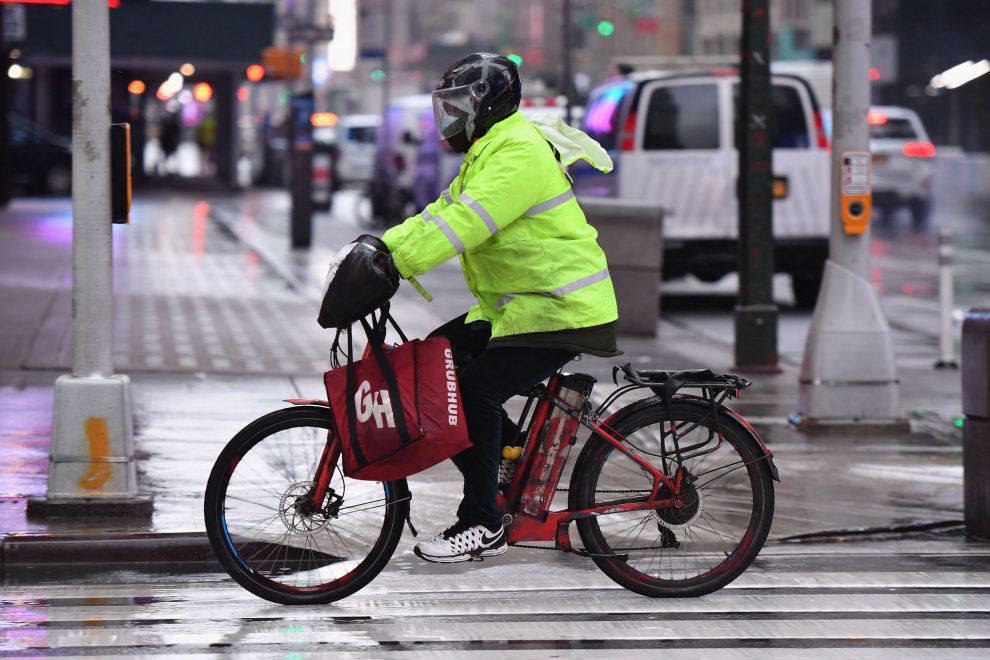With e-bikes causing deadly fires and delivery workers scrambling to make ends meet, the private sector that has spawned a booming food delivery business has been repeatedly attacked for not doing enough to address the problems that have accompanied the industry’s rapid growth.
But some companies appear to be taking early steps to help make e-bikes safer.
In an effort to reduce explosions from faulty units, Uber announced this week that it will subsidize trade-in programs seeking to provide a cheaper pathway for purchasing UL-certified e-bike batteries. The third-party app will also donate $100,000 to the FDNY for education campaigns on e-bike safety.
FDNY Commissioner Laura Kavanagh said earlier this year that the number of fires ignited from battery-powered scooters and bikes was already four times higher than incidents recorded in the same period last year.
On Monday, the death toll grew after a 7-year-old boy and his 18-year-old sister in Astoria were killed in a fire caused by an e-bike explosion. The fire ignited in the second-floor apartment, blocking the only exit with flames and black smoke.
Couriers, who are largely recent immigrants to the city, often rely on cheaper off-brand batteries to start work and to keep up with demand, as higher-quality, reputable batteries from companies like Bosch or Shimano can cost anywhere from $500 to $950, depending on the model.
“We have to do our part to flood the market with UL-certified products so that there’s a safer alternative that is also affordable,” said Uber spokesperson Freddi Goldstein.
Uber, which already upended the traditional taxicab market, is among companies like DoorDash and GrubHub that have revolutionized food delivery, propelling it to a $150 billion global industry — triple what it was in 2017. And New York City is one of the biggest markets.
Goldstein said because the market is oversaturated with different types of e-bikes, with many having unique battery compatibility, e-bikers looking for safer lithium-ion batteries must purchase entirely new units.
The third-party app is paying more than $500,000 to cover the difference for new e-bike purchases, Goldstein said. The actual exchanges will be carried out by two separate organizations, Zoomo and the Equitable Commute Project.
Mayor Eric Adams praised Uber’s efforts in a statement.
“This program to increase access to safe and certified e-bikes and batteries for our delivery workers is a welcomed complement to our ‘Charge Safe, Ride Safe’ plan to keep New Yorkers safe from lithium-ion battery fires,” he said. “We appreciate Uber stepping up to the plate to help in a major way.”
Amy Perlik Healy, a spokesperson for Grubhub said the company is “actively pursuing partnerships to ensure safer e-bike use while preserving access to the bikes for those independent delivery partners who rely on them.” She did not delve into specific plans.
Ligia Guallpa, director of the Workers Justice Program, said it would be preferable if city leaders did more to ensure the safety of e-bikes and delivery workers — and that it was the app companies that have created the problem in the first place by “recklessly widening radiuses without notice.”
“New York City must ensure delivery workers can access safe, affordable e-bikes without being at the mercy of private companies,” Guallpa said.
The city’s first attempt to install a safe e-bike charging and rest station was met with substantial local pushback, and a proposed location on the Upper West Side appears to be a nonstarter.
That’s where Whizz, a New York-based startup, claims it can fill a persistent need. The subscription-based service charges e-bikers $170 a month to rent the company’s machines. And co-founder Mike Peregudov said Whizz will also open three new rest stops for delivery workers in Brooklyn and Manhattan.
Last month, the City Council signed five bills tightening rules around lithium-ion batteries into law. And as regulations catch up with technology, a lot of e-bikes and e-bike batteries may be taken off the market.
“Ninety percent of e-bikes on the market will become illegal in the next six months,” Peregudov said, adding the company is banking on increasing controls lawmakers exert on the e-bike industry. Whizz announced this week it raised investments up to a total of $4.5 million from from Joint Journey, TMT Investments and a group of angel investors.
“We have a huge demand,” Peregudov said, “With [this] new regulation it’ll be impossible to buy cheap.”
Currently, Peregudov estimates that 80% of Whizz customers rent monthly, another 15% are enrolled in its rent-to-own program, and 5% are buying the company’s e-bikes wholesale.
This story has been updated to include that we are waiting for a response from DoorDash.
Source: Gothamist



























